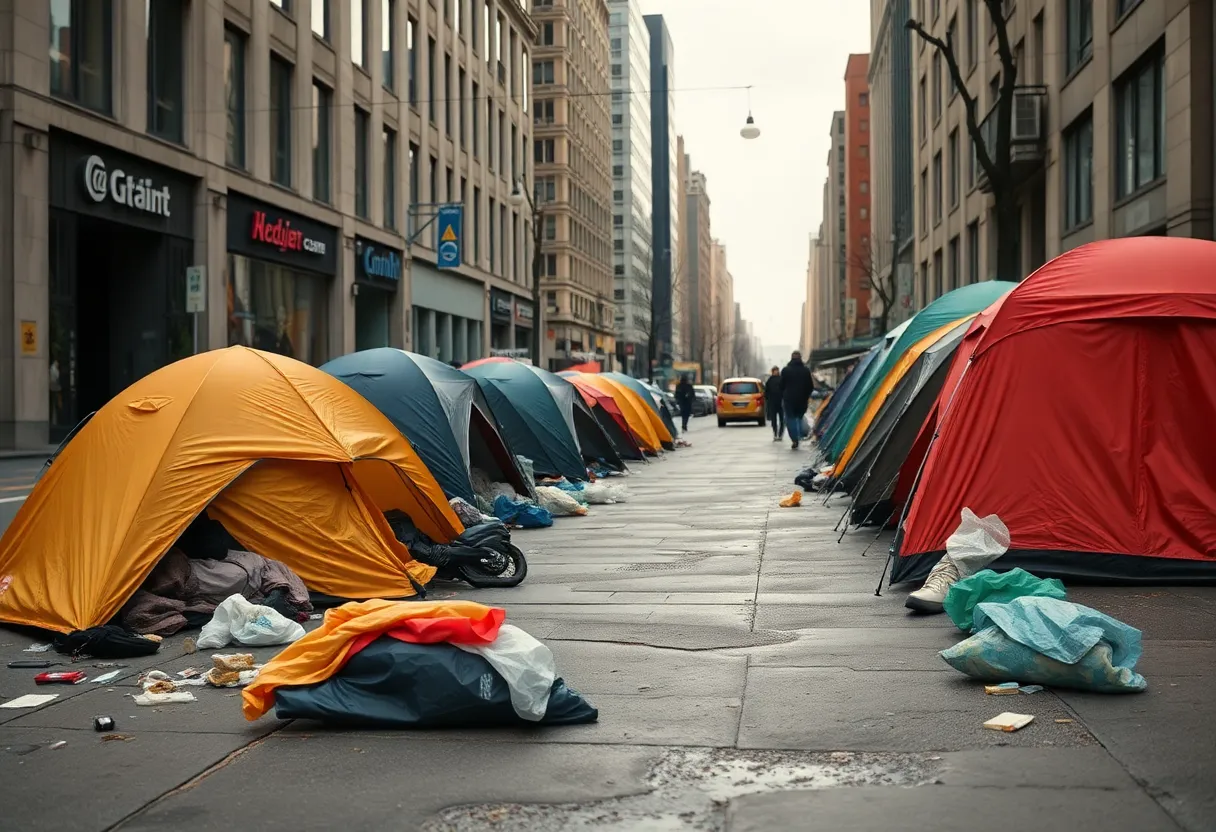News Summary
Boston City Council members are advocating for a regional fund to address homelessness, addiction, and mental health issues at the Mass. and Cass intersection. Councilor John FitzGerald is leading the initiative aimed at financial contributions from Boston and neighboring municipalities. The proposal seeks coordinated long-term solutions amidst rising drug-related problems and community concerns. A hearing for further discussion is expected soon as officials explore collaborative regional efforts to address these complex challenges affecting Boston and surrounding areas.
Boston City Council members are calling for a regional fund aimed at addressing the crises of homelessness, addiction, and mental health concentrated around the intersection of Massachusetts Avenue and Melnea Cass Boulevard, commonly referred to as Mass. and Cass. This initiative seeks to alleviate the burden that has disproportionately fallen on Boston and encourages neighboring communities to play a part in managing the complex issues faced by this specific area.
Councilor John FitzGerald is championing the proposal for an intermunicipal fund, which would require financial contributions from Boston as well as its surrounding municipalities. The goal of this fund would be to finance coordinated and long-term solutions targeting the challenges presented by the overlapping crises in the region. During a recent City Council meeting, FitzGerald introduced this idea, which garnered significant support and was subsequently referred to the Committee on Public Health, Homelessness, and Recovery, which he chairs. A hearing to discuss the proposal in greater detail is expected to be scheduled soon, where officials and experts will provide insights and perspectives on the matter.
FitzGerald emphasized the importance of collaboration among cities, pointing out that Boston provides a range of services that benefit individuals from neighboring regions without receiving adequate support for sustainability. This imbalance has contributed to the ongoing issues at Mass. and Cass, where conditions have deteriorated since the 2014 closure of the Long Island Bridge. This closure cut off access to an addiction recovery campus, further exacerbating the struggles faced by individuals in the area.
The situation has prompted responses from City officials, including a major initiative led by Mayor Michelle Wu in 2023, aimed at clearing tent encampments from the area. Despite these efforts, concerns persist regarding the spread of “congregate drug use” across other parts of Boston. Residents have reported increased litter, used needles, and human waste in their neighborhoods, indicating the crisis is not limited to just Mass. and Cass. Recent data reveals that while the number of individuals gathering for drug use outdoors has decreased, related challenges, particularly in downtown and the South End, have intensified.
In the South End, residents are experiencing a sharp rise in drug-related activities, such as open drug dealing, along with a heightened sense of insecurity and complaints over littered needles. Councilor Erin Murphy expressed concern that current strategies are failing to improve conditions in the area. City officials, while acknowledging the difficulties, claim that progress is being made, highlighted by a reduction in major tent encampments compared to previous years. However, a significant proportion of the individuals accessing services in the Mass. and Cass area do not reside in Boston.
Despite the supportive sentiment towards FitzGerald’s proposal, there are currently no specific details provided regarding funding amounts or contributions. The council member made it clear that this initiative is just the starting point for discussions on the matter. The upcoming hearing is anticipated to involve testimonies from the Wu administration, municipal leaders, public health advocates, and other stakeholders. Initial indications suggest that the Wu administration may be in favor of the concept of a pooled fund to tackle regional challenges linked to the crises centered in Boston.
Many City Council members are echoing the belief that the issues at Mass. and Cass necessitate collaborative regional solutions, rather than solely relying on Boston’s resources. FitzGerald noted that although this proposal might face political hurdles, there is an ethical obligation to seek assistance from surrounding municipalities. The rise in crime, homelessness, and drug use tied to Mass. and Cass has catalyzed a call for urgent reform and a reevaluation of current strategies.
Residents in affected neighborhoods have organized community meetings to express their frustrations related to escalating crime, declining quality of life, and rampant drug use in their surroundings. The city’s Public Health Commissioner has acknowledged that current efforts to combat the drug epidemic have not produced satisfactory outcomes, highlighting a critical need for a shift in its approach to address these persistent challenges.
Deeper Dive: News & Info About This Topic
HERE Resources
Boston Mayoral Race Heats Up: Wu and Kraft Debate Key Issues
Boston’s Mayoral Race Faces Controversy Over Super PAC Spending
Boston Mayoral Race Heats Up Between Wu and Kraft
Super PAC Backs Josh Kraft Against Mayor Wu in Boston
Boston Mayoral Candidate Critiques City Council’s Actions
Boston Mayoral Candidate Unveils Bold Plan for Opioid Crisis
Additional Resources
- Boston.com: City Councilors Call for Action on Mass and Cass
- Boston 25 News: Mass and Cass Approach Changes
- WHDH: Regional Fund Proposal for Mass and Cass
- Encyclopedia Britannica: Massachusetts Homelessness
- Google Search: Mass and Cass

Author: STAFF HERE BOSTON WRITER
The BOSTON STAFF WRITER represents the experienced team at HEREBoston.com, your go-to source for actionable local news and information in Boston, Suffolk County, and beyond. Specializing in "news you can use," we cover essential topics like product reviews for personal and business needs, local business directories, politics, real estate trends, neighborhood insights, and state news affecting the area—with deep expertise drawn from years of dedicated reporting and strong community input, including local press releases and business updates. We deliver top reporting on high-value events such as Boston Marathon, Head of the Charles Regatta, and Boston Harborfest. Our coverage extends to key organizations like the Greater Boston Chamber of Commerce and Associated Industries of Massachusetts, plus leading businesses in finance, biotech, and insurance that power the local economy such as Fidelity Investments, Biogen, and Liberty Mutual Insurance. As part of the broader HERE network, we provide comprehensive, credible insights into Massachusetts's dynamic landscape.



